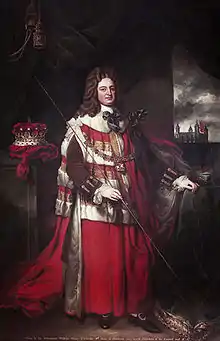6th Parliament of King William III
The 6th Parliament of William III was summoned by William III of England on 3 November 1701 and assembled on 30 December 1701. Its composition was 248 Whigs, 240 Tories and 24 others; Robert Harley, the member for Radnor, was re-elected Speaker of the House of Commons.

The French King had made plain his expansionist aims in Europe with the threat that posed to English interests and public opinion was now in favour of war. The new Parliament busied itself with the necessary preparations. On 9 January 1702 the House of Commons received the text of the Grand Alliance between the King, the Emperor and the United Provinces. Both parties co-operated to fulfil the King's requests and by the end of February the ways and means arrangements were almost complete.
But on 7 March 1702 the news broke that the King was dying and hurried arrangements were made to complete the war preparations. The following day the King was dead and had been succeeded by his sister-in-law, Queen Anne. Under an Act of 1696 Parliament continued to meet for the next two months to enable the new Queen and her ministers to finalise the essential war measures. On 2 May 1702 the Queen communicated to the Commons the declaration of war by England and her allies on France and Spain.
The Parliament was dissolved on 2 July 1702.
Acts passed by the Parliament
See also
- Acts of the 6th Parliament of William III
- List of Parliaments of England
References
- "The 5th Parliament of William III". History of Parliament Online. Retrieved 5 November 2017. - Note:6th Parliament considered the 5th by History of Parliament
.svg.png.webp)
